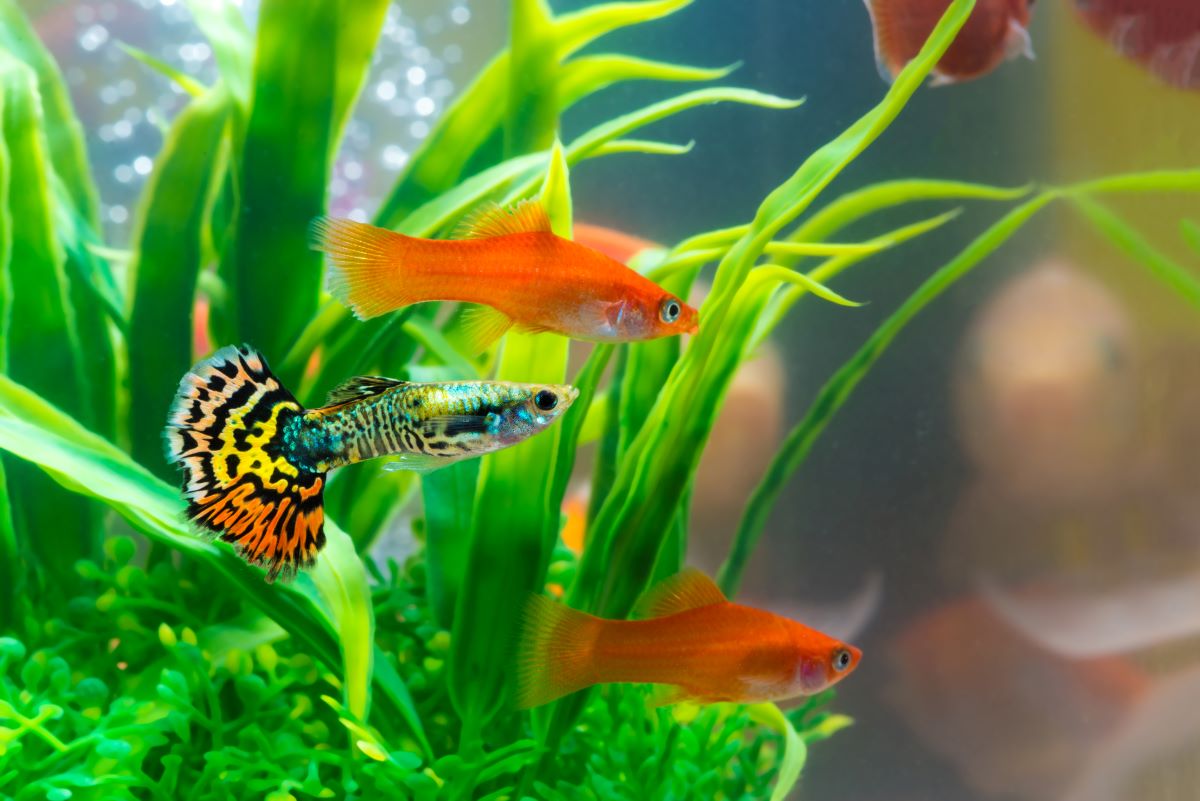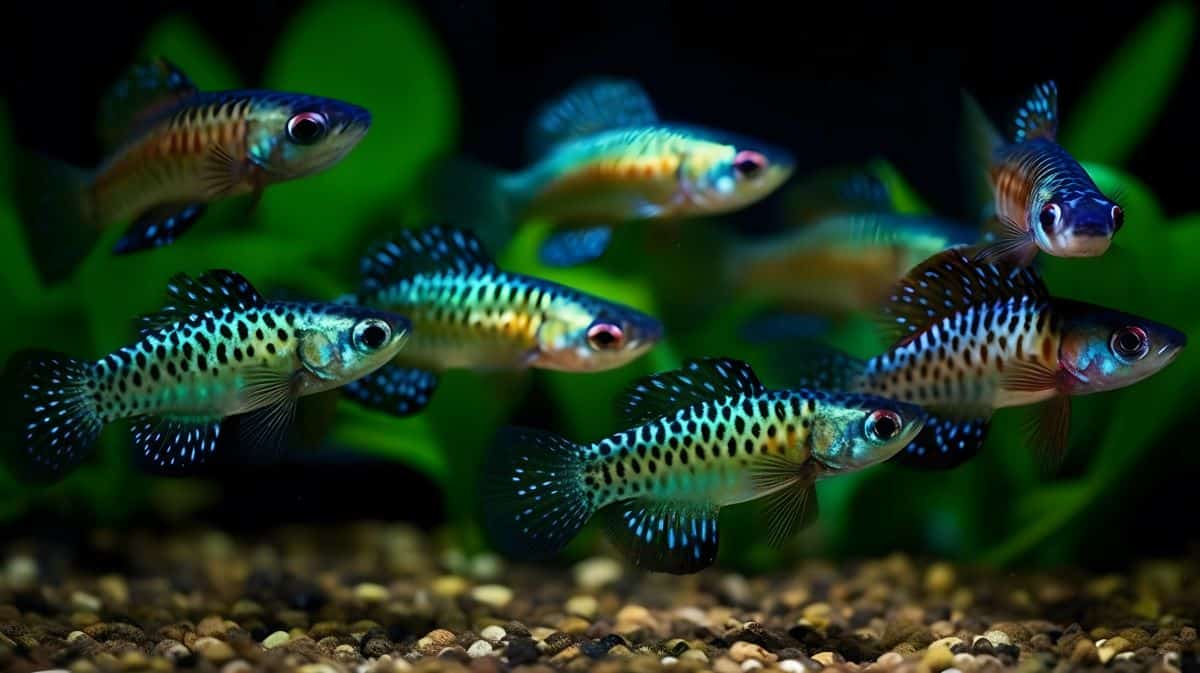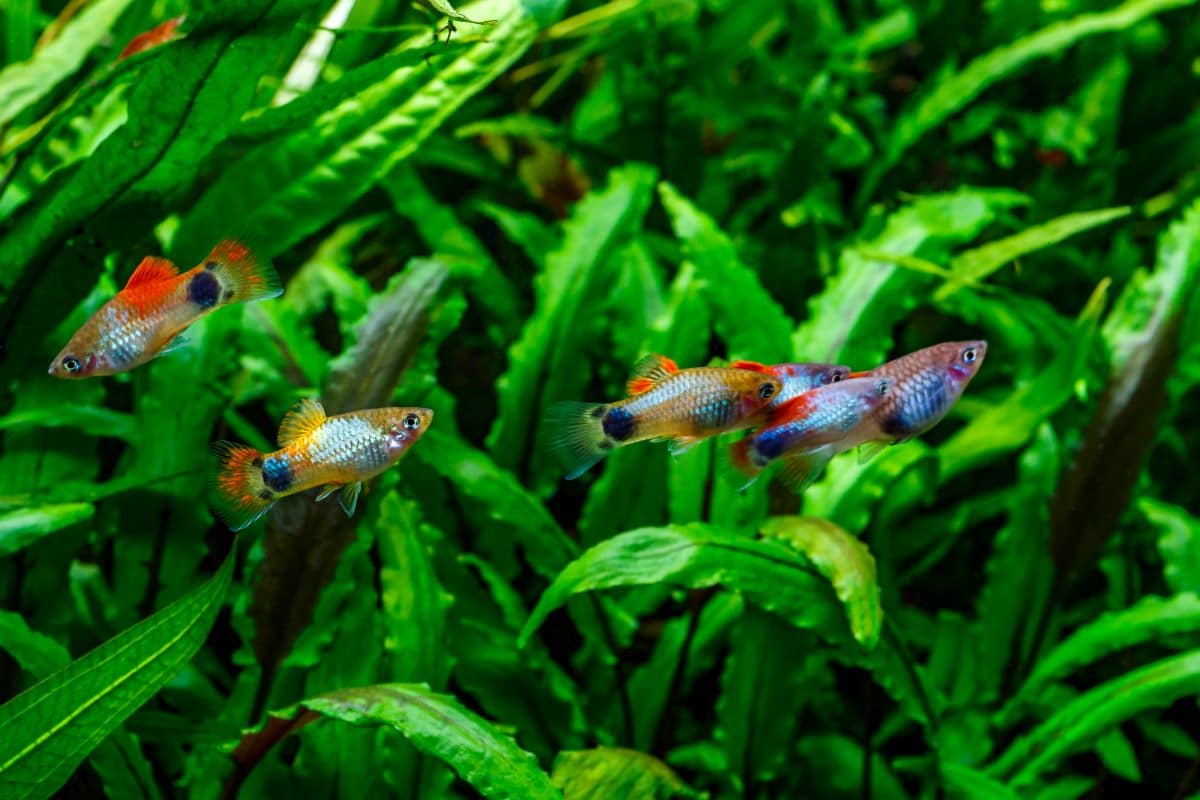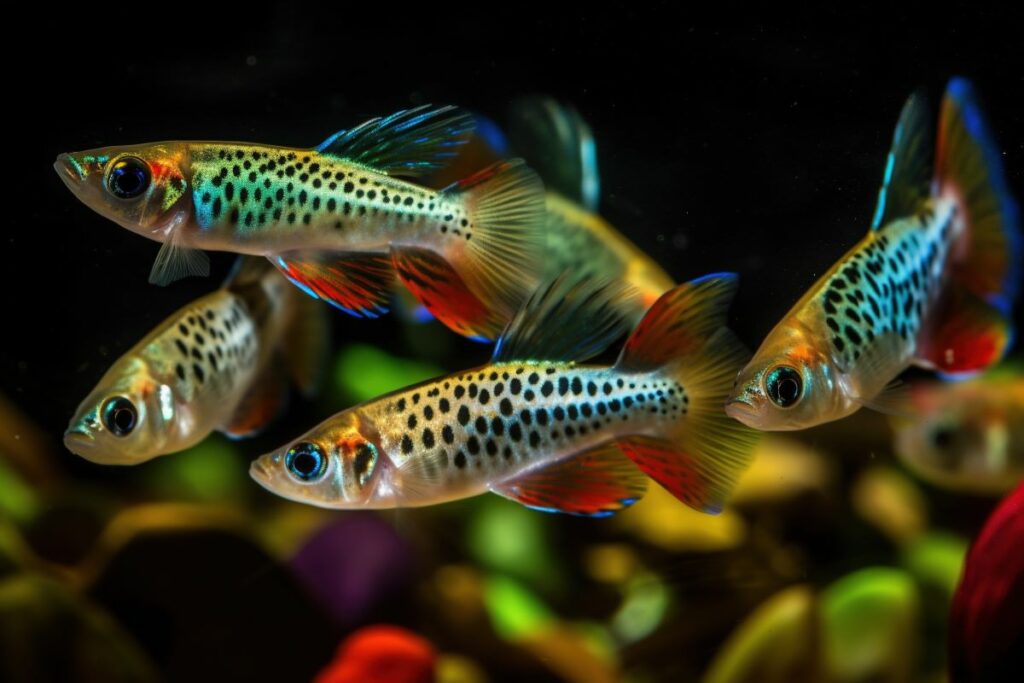the essentials in brief
Guppies can live up to 2 years on average, but with optimal care and good conditions they can live up to 5 years. Learn more about the lifespan of fish here...
The gestation period for guppies is usually between 21 and 30 days.
Guppies are omnivores, they can be fed flake, frozen or live foods such as daphnia and Artemia. Here you will find important information about feeding guppies...
Guppies are popular freshwater fish, known for their bright colors and easy attitude. In this guide, you'll learn everything you need to know about guppies - from theirs Life expectancy about the sigh to the right one Nutrition. Whether you already own guppies or are considering getting some, this article will provide you with valuable information and practical tips to keep your guppies healthy and happy.
The lifespan of guppies

guppies are colourful and lively Freshwater fish that amaze many people with their charm and beauty. Anyone who decides to keep guppies will want to know how long these fascinating creatures can stay with them. The Lifespan of guppies depends on various factors from, but in general it is about two to three years.
However, it is important to know that guppies under optimal conditions can live longer. With good care and in a healthy environment, some guppies can even up to five years to become old. Genetics, water quality, diet and stress levels all play a crucial role in the life expectancy of these fish.
In order to maximize guppies lifespan, there are a few important aspects to consider. A good water quality is very important. Provide clean water that is regularly tested and treated as needed. Make sure the pH and temperature of the water are appropriate for the guppies' needs. One good filtered aquarium with sufficient swimming and hiding places is also important so that the guppies can get along well.
The way food is Nutrition plays a crucial role in the longevity of guppies. A balanced and varied diet is the be-all and end-all. Guppy flake food, which is specially tailored to the needs of guppies, forms the basis. Supplement the food regularly with live food such as mosquito larvae or artemia to support the guppies' natural eating habits. For a change, frozen food such as Daphnia or Cyclops can also be offered.
Stress can negatively affect the lifespan of guppies. Take care of a good structured aquarium with enough hiding places and plants that offer the guppies a place to retreat. Also avoid excessive exposure to light and heavy water movement as this can cause stress.
Tip: Maintain good water quality, a balanced diet, and a stress-free environment to prolong the lifespan of your guppies.
Reproduction in guppies
Guppies reproduction is a fascinating process that showcases nature in all its glory. As viviparous fish guppies give live birth to their young, which distinguishes them from many other fish species. If one is interested in keeping guppies, it is important to understand the basics of their reproduction.
The gestation period the guppies is usually 22 to 30 days. It depends on various factors such as temperature and water conditions. During this time, the young develop in the womb and are born fully functional. It is amazing to watch the little guppies hatch from the mother's womb and immediately start swimming.
Female guppy have the remarkable ability to offspring at short intervals to get. A single act of mating can result in multiple consecutive litters. It is therefore important that there are enough in the aquarium hiding places are in place to protect the young fish. Planted areas and hiding places are ideal for hiding the juvenile fish from the prying eyes of the other fish.
Guppies
Guppies are known for their amazing ability to adapt to different habitats. In the wild, they are found in a variety of bodies of water, from clear rivers to murky puddles. This adaptability has led to guppies being native to many parts of the world and able to breed successfully. It is fascinating to see how these small fish are able to adapt and survive in different water conditions.

The rearing of guppy pups
The rearing from guppy pups is an exciting challenge. Although the mother gives birth to the young, they are not cared for by the parents and have to be independent from the beginning. The young fish are immediately able to swim and search for food. Care should be taken to ensure that there are enough in the aquarium delicate plants are present, which can serve as a hiding place and source of food for the young fish.
It is important to note that guppy juveniles are separated from adult guppy as potential prey can be viewed. It is therefore recommended to place the fry in either a separate breeding tank to transfer or to offer enough hiding places in the main aquarium to ensure their survival.
Guppies reproduction is a fascinating part of their life cycle. If you choose the sigh of guppies, you can different breeding variants try them out to get specific characteristics like colors and fin shapes. However, keep in mind that breeding guppies also comes with some responsibility, as uncontrolled reproduction can lead to overpopulation and problems in the aquarium.
Note: Make sure the tank has adequate hiding places to provide shelter for the guppy hatchlings.
Feeding guppies
For the well-being and health of guppies is one balanced and varied diet important. As omnivores, guppies have a high energy requirement and need a variety of nutrients in order to develop optimally. Here are some important points to keep in mind when feeding your guppies.
- Guppy Flake Food: Guppy flake food forms the basis of your guppies' diet. Choose high-quality food that is specifically tailored to the needs of guppies. Guppy flakes contain a balanced mix of proteins, carbohydrates and vitamins that meet the nutritional needs of your guppies.
- live food: Regularly supplement your guppies' diet with live food to support their natural eating habits. Bloodworms, brine shrimp and water fleas are popular options. Live food is rich in protein and promotes the growth and vitality of your guppies. You can either breed live food yourself or buy it from pet stores.
- Frozen feed: Frozen food such as daphnia, cyclops or bloodworms is another good option to ensure a varied diet for your guppies. Frozen food retains most of the nutrients and vitamins that are important for the health of your fish. Make sure to thaw the frozen food well before feeding.
- Plant-based diet: Although guppies are omnivores, it's important to include plant-based foods in their diet as well. Occasionally offer your guppies cooked vegetables like peas or spinach. This provides them with fiber and supports healthy digestion.
- Feeding amount and frequency: Feed your guppies several times a day in small portions that they can consume completely within minutes. Overfeeding can lead to water stress and digestive problems. Make sure that no food remains in the aquarium to keep the water clean.
- Quality of the lining: Choose high quality food that is free from harmful additives and contaminants. Pay attention to the expiration date and store the food in a cool and dry place to preserve its freshness and quality.

Colorful and lively fish
The Care and Observation Yours Guppies can be a fascinating experience. With the right information and tips, you can ensure your guppies live long and healthy lives. In this guide we've covered the most important aspects of guppy husbandry, from lifespan to reproduction to proper feeding. If you inform yourself well and respond to the needs of your guppies, you will enjoy them very much colorful and lively fishing to have.


